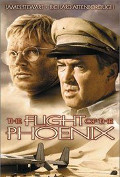
Directed by
Robert Aldrich
136 minutes
Rated PG
Reviewed by
Bernard Hemingway

Flight Of The Phoenix, The (1965)
The Flight Of The Phoenix can be included in that broad category of films such as The Great Escape (1963), Lawrence Of Arabia (1962), the latter albeit mainly for the sand, and even Aldrich’s own The Dirty Dozen (1967) that spoke to still-alive memories of WWII, celebrated manly courage and resourcefulness and drew on the allure of a marquee cast
It deals with a motley group of men in the Sahara Desert who cobble together a plane out of the old hulk they have crashed in. Amongst the survivors of the initial crash, some of whom progressively get picked off are a tip-top cast including James Stewart, Richard Attenborough, Peter Finch, Hardy Krüger and Ernest Borgnine as well as smaller fry such as Ian Bannen (who surprisingly was nominated for an Oscar). The only female presence is via a Playboy magazine and a dimly discernable belly dancer.
Whilst technically the film has its shortcomings, particularly in the use of back projection for some of the scenes, it is by-and-large still effective today the carcase of the defunct plane serving as single set within which the film explores the dynamics between the men. Whilst these are not stereotypes Aldrich’s direction tends to be heavy-handed in laying out their characters – Stewart as the crusty old timer, Attenborough as his gimpy offsider, Finch as a British officer and a gentleman, Krüger as an obsessively correct German, Bannen as a racist and so on. Taking this to annoying lengths is Borgnine as a grinning dim-wit.
The central motif of the clash between old school “right stuff” heroism represented by Stewart and modern scientific rationalism, represented by Krüger is quite well handled with Stewart’s reflection that “the little men with their slide-rules and computers will inherit the Earth” being remarkably prescient.
Nevertheless some pruning of the reiterative characterizations would have helped in giving the film more purchase for a modern audience.
FYI: An end-title dedicates the film to Paul Mantz, the pilot doubling for Stewart, who died as a result of Phoenix crashing during the second take of its lift-off though the idea of him “giving his life” to the making of the film seems a tad disingenuous.
The film was remade in 2004 with Dennis Quaid in the Jimmy Stewart role and Miranda Otto thrown into the mix but overall, despite the improvements in the technical department, as is so often the case with remakes, with overall inferior results.
Want something different?





